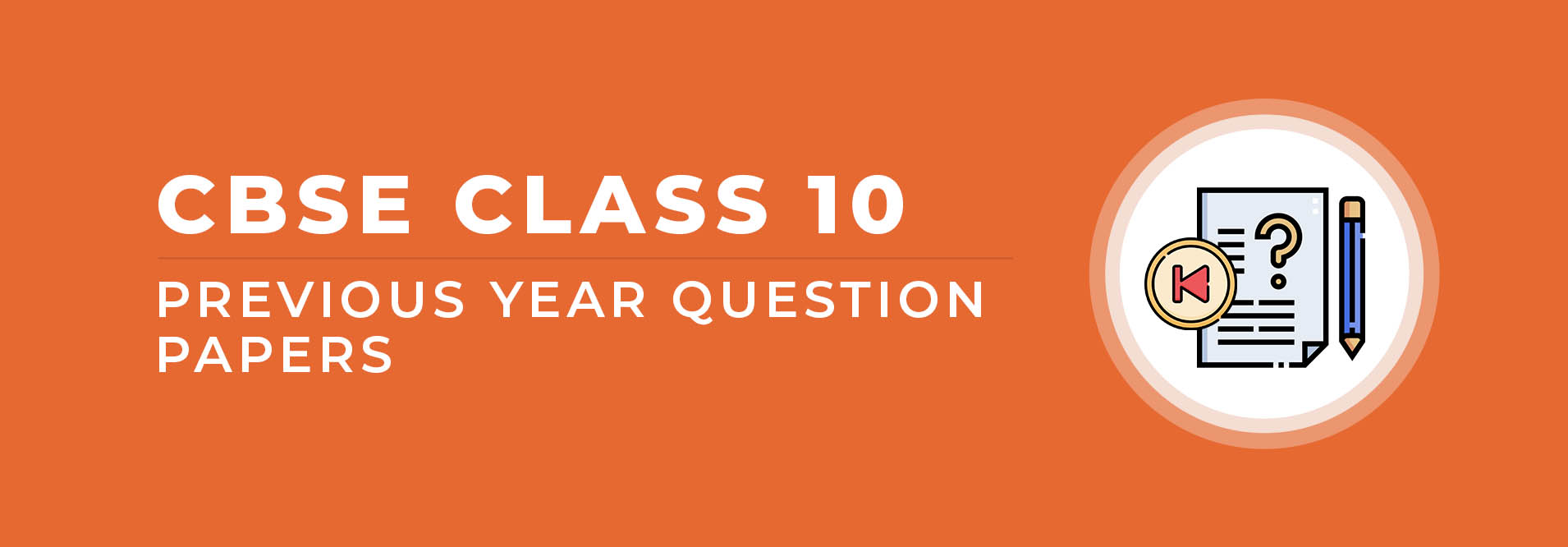CBSE Previous Year Question Papers for Class 10 Students | Download Free PDF
Solving CBSE Class 10 Previous Year Question Papers is one of the best ways to prepare for board exams. These papers provide insights into the type of questions, marking schemes, and frequently tested concepts, allowing students to practice under real exam conditions. This guide covers subject-wise and year-wise papers from 2019, 2020, 2022, 2023, and 2024 to help students improve their preparation.
CBSE Class 10 Previous Year Question Papers – Subject-wise
| Subject | 2019 | 2020 | 2022 | 2023 | 2024 |
| Science | Explore CBSE Science 2019 Question Paper | Explore CBSE Science 2020 Question Paper | Explore CBSE Science 2022 Question Paper | Explore CBSE Science 2023 Question Paper | Explore CBSE Science 2024 Question Paper |
| Maths (Standard) | Explore CBSE Maths 2019 Question Paper | Explore CBSE Maths 2020 Question Paper | Explore CBSE Maths 2022 Question Paper | Explore CBSE Maths 2023 Question Paper | Explore CBSE Maths 2024 Question Paper |
| Social Science | Explore CBSE Social Science 2019 Question Paper | Explore CBSE Social Science 2020 Question Paper | Explore CBSE Social Science 2022 Question Paper | Explore CBSE Social Science 2023 Question Paper | Explore CBSE Social Science 2024 Question Paper |
| English | Explore CBSE English 2019 Question Paper | Explore CBSE English 2020 Question Paper | Explore CBSE English 2022 Question Paper | Explore CBSE English 2023 Question Paper | Explore CBSE English 2024 Question Paper |
Details of CBSE Class 10 Previous Year Question Papers
1. CBSE Science Previous Year Question Papers
Science combines Physics, Chemistry, and Biology, making it essential to practice thoroughly.
2019
- Key Highlights: Application-based questions on laws of motion, periodic classification of elements, and life processes.
- Why Solve?: Strengthen your basics and understand real-world applications of scientific concepts.
2020
- Key Highlights: Balanced mix of numerical problems, theoretical questions, and experiment-based queries.
- Why Solve?: Focus on numerical accuracy and understanding scientific methodologies.
2022
- Key Highlights: Emphasis on diagram-based questions (e.g., ray diagrams in optics, human digestive system) and analytical problem-solving.
- Why Solve?: Enhance your ability to present answers with clarity and diagrams.
2023
- Key Highlights: Questions on environmental management, chemical reactions, and heredity.
- Why Solve?: Focus on conceptual clarity and precision in answering.
2024
- Key Highlights: Recent trends include higher weightage for application-based and HOTS (Higher Order Thinking Skills) questions.
- Why Solve?: Practice the latest question patterns to be well-prepared for the upcoming exams.
2. CBSE Maths Previous Year Question Papers
CBSE offers Maths at two levels: Standard and Basic, catering to different levels of student proficiency.
2019
- Key Highlights: Questions on quadratic equations, surface area & volume, and arithmetic progressions.
- Why Solve?: Build foundational problem-solving skills in algebra and geometry.
2020
- Key Highlights: Trigonometry, probability, and statistics-based questions tested analytical and computational skills.
- Why Solve?: Strengthen your ability to solve complex problems under time constraints.
2022
- Key Highlights: Equal focus on both theoretical and practical application of concepts.
- Why Solve?: Sharpen your accuracy in solving numerical problems.
2023
- Key Highlights: HOTS and application-based problems in areas like coordinate geometry and polynomials.
- Why Solve?: Focus on answering stepwise to gain maximum marks in lengthy questions.
2024
- Key Highlights: New patterns emphasize conceptual clarity and multi-step problems.
- Why Solve?: Familiarize yourself with the latest question trends and practice both levels.
3. CBSE Social Science Previous Year Question Papers
Social Science encompasses History, Geography, Civics, and Economics, testing students’ analytical, writing, and map-reading skills.
2019
- Key Highlights: Topics like the Indian national movement, natural vegetation, and consumer rights.
- Why Solve?: Strengthen your ability to write descriptive answers and analyze historical trends.
2020
- Key Highlights: Case studies in Economics and map-based questions in Geography.
- Why Solve?: Practice data interpretation and map skills to score high.
2022
- Key Highlights: Balanced focus on analytical and descriptive questions.
- Why Solve?: Enhance your ability to interpret data and articulate points effectively.
2023
- Key Highlights: Recurring topics included sustainable development and federal structures.
- Why Solve?: Prepare for in-depth questions requiring detailed understanding and application.
2024
- Key Highlights: New patterns emphasize linking historical events to present scenarios.
- Why Solve?: Focus on writing concise yet impactful answers.
4. CBSE English Previous Year Question Papers
The CBSE English paper is divided into Reading, Writing, and Grammar, along with questions based on the First Flight and Footprints Without Feet textbooks.
2019
- Key Highlights: Emphasis on comprehension passages and creative writing (essay and letter).
- Why Solve?: Strengthen vocabulary and writing precision.
2020
- Key Highlights: Literature-based questions from The Proposal and The Necklace tested critical thinking.
- Why Solve?: Enhance your ability to interpret and analyze literary texts.
2022
- Key Highlights: Grammar-based fill-in-the-blank questions and precise writing tasks.
- Why Solve?: Build accuracy in grammar and concise writing.
2023
- Key Highlights: Focus on both creative writing and critical analysis of prose and poetry.
- Why Solve?: Improve comprehension and coherence in answering subjective questions.
2024
- Key Highlights: Introduction of scenario-based comprehension questions and structured writing tasks.
- Why Solve?: Prepare for the latest question formats to score better in language proficiency.
Evolution of CBSE Class 10 Exam Patterns (2019-2024): A Subject-Wise Analysis
| Subject | Year | Exam Pattern Changes |
| Science | 2019 | Traditional focus on theoretical questions with limited application-based queries. |
| 2020 | Introduction of a balanced mix of numerical problems, theoretical questions, and experiment-based queries. | |
| 2022 | Emphasis on diagram-based questions (e.g., ray diagrams in optics, human digestive system) and analytical problem-solving. | |
| 2023 | Inclusion of questions on environmental management, chemical reactions, and heredity, focusing on conceptual clarity. | |
| 2024 | Implementation of a new exam pattern with 50% competency-based questions, including multiple-choice questions (MCQs), case-based questions, and source-based integrated questions, to evaluate higher-order thinking skills. | |
| Mathematics | 2019 | Focus on problem-solving in areas like algebra, geometry, and trigonometry with traditional question formats. |
| 2020 | Introduction of questions testing analytical and computational skills, including trigonometry, probability, and statistics-based questions. | |
| 2022 | Balanced emphasis on both theoretical and practical applications, with real-life problem scenarios. | |
| 2023 | Inclusion of Higher Order Thinking Skills (HOTS) questions, particularly in coordinate geometry and polynomial sections. | |
| 2024 | Adoption of a revised exam structure featuring 50% competency-based questions, aiming to assess students’ conceptual clarity and application skills. | |
| Social Science | 2019 | Focus on descriptive questions covering history, geography, civics, and economics, with an emphasis on memorization. |
| 2020 | Introduction of case studies in Economics and map-based questions in Geography to assess analytical skills. | |
| 2022 | Shift towards analytical questions requiring interpretation of data, maps, and case studies, promoting critical thinking. | |
| 2023 | Introduction of questions linking historical events to contemporary issues, encouraging students to draw connections between past and present. | |
| 2024 | Implementation of a new pattern with 50% competency-based questions, including case-based and source-based questions, to assess students’ analytical and evaluative skills. | |
| English | 2019 | Traditional focus on reading comprehension, grammar, and writing skills, with literature questions based on prescribed texts. |
| 2020 | Introduction of more analytical questions in the literature section, requiring critical evaluation of themes and character development. | |
| 2022 | Emphasis on creative writing and expression, with prompts encouraging original thought and personal reflection. | |
| 2023 | Inclusion of scenario-based comprehension questions and structured writing tasks to assess language proficiency and critical thinking. | |
| 2024 | Adoption of a revised exam pattern featuring 50% competency-based questions, including scenario-based comprehension and structured writing tasks, to assess language proficiency and critical thinking. |
Why Practice CBSE Class 10 Previous Year Question Papers?
- Understand Exam Patterns: Familiarize yourself with the question paper format, including the distribution of marks and section weightage.
- Identify Important Topics: Spot recurring concepts and frequently asked questions to focus on key chapters.
- Boost Confidence: Solve actual board exam papers to gain familiarity and reduce anxiety.
- Improve Time Management: Learn to allocate time effectively to different sections of the paper.
- Enhance Problem-Solving Skills: Tackle challenging questions to sharpen analytical and critical thinking abilities.
How to Use CBSE Class 10 Previous Year Question Papers Effectively?
- Time Management: Practice solving papers within the exam duration to improve speed and accuracy.
- Analyze Mistakes: Review incorrect answers to identify and work on weak areas.
- Focus on Weak Sections: Spend extra time on topics or subjects where you face difficulty.
- Practice Stepwise Solutions: Learn to present detailed answers to secure maximum marks.
- Simulate Exam Environment: Solve papers in a distraction-free setup to replicate exam conditions.








Get Social